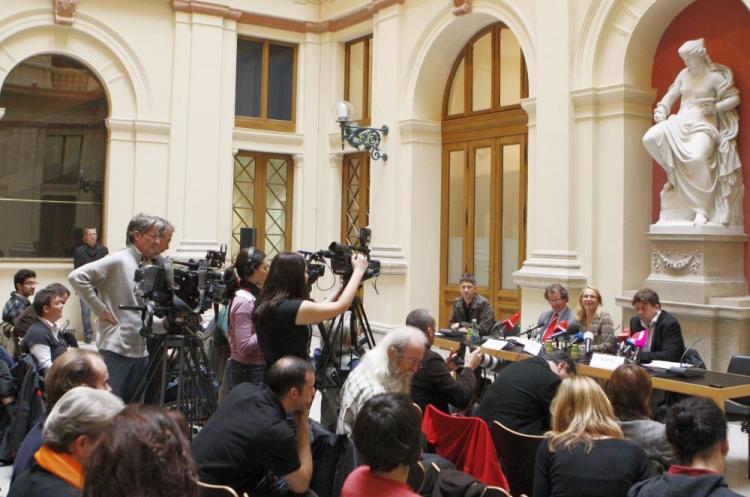Chechen President Ramzam Kadyrov will be under intense scrutiny as the murder trial of his bodyguard begins on Tuesday in Vienna—a murder the Kremlin-backed president is believed to be responsible for.
On Nov. 16, three defendants will stand trial for their role in the killing of Umar (Alikhan) Israilov, a former Chechen militant and Kadyrov’s bodyguard, who was murdered in a failed kidnapping attempt in January 2009.
Austrian investigators accuse Shaa Turlaev, a forth defendant and Kadyrov’s close confidant, of ordering the kidnapping, but they do not have evidence that he was acting on behalf of the Chechen president. Turlaev’s whereabouts are unknown.
However, the Austrian State Offices of Domestic Security and Counterterrorism believe Kadyrov incited the murder.
Case against Kadyrov
Israilov joined a local rebel group in the second Chechen war in 2000. He was captured and detained in a camp from April to July 2003 in the village of Tsentoroi, Kadyrov’s hometown. According to testimony from Israilov, he was tortured by Kadyrov himself during his captivity. Subsequently, he was forced to become the Chechen president’s bodyguard. He also testified that he witnessed multiple cases of torture and illegal executions carried out by Kadyrov and his gangs.
“Kadyrov’s guards forced me to sit on an exercise machine and attached one cable to my ear and another to my little finger. Then, Kadyrov began turning the crank handle, which delivered an electric shock. I felt an awful pain in my head and my hand,” said Israilov in testimony given to the European Center for Constitutional and Human Rights (ECCHR) and available on their website.
Israilov and his family fled Chechnya to Poland in the autumn of 2004 using fake passports. In 2006, he had publicly accused Kadyrov of torturing him and filed an application with the European Court of Human Rights.
In 2008, a Chechen man, known as Artur Kurmakayev acting on behalf of Kadyrov, contacted Israilov and threaten him to withdraw the complaint from the court and tried to convince Israilov to return to Chechnya. Israilov’s family members were also detained including his father for 10 months.
After the Kurmakayev incident, Israilov noticed he was being watched. At that point he sought protection from Austrian police, where he was living by then, but was turned down. He tried again in January 2009, but was again refused. A few days later he was dead.
“At this point, there was sufficient evidence indicating the preparation of a politically contracted murder,” concluded ECCHR in a background paper on Israilov’s cases.
“The indictment says this is a political murder, and it seems very plausible that Israilov was targeted because he directly accused the Chechen leader of torture,” said Rachel Denber, Europe and Central Asia director at Human Rights Watch, in a statement released on Nov. 14.
“So here is the question: What have the Russian authorities done to investigate any involvement in this case by the Chechen leadership—and more broadly, to find out who is responsible for the litany of serious human rights violations in Chechnya that have been documented by rights groups and journalists?” Denber added, linking Israilov’s murder to many other cases, most notably the assassination of Chechen human rights activist Natalia Estemirova in 2009 that sparked an international outcry.
Andreas Schüller, a lawyer with ECCHR, said that the Austrian authorities might charge Kadyrov, but they still lack the necessary evidence.
“I think the prosecutor’s office will wait until the end of the trial so that they can continue the investigation based on the given results,” Schüller said in an interview with German newspaper Deutsche Welle.
North Caucasus remains one of the dangerous regions in the Russian Federation with militants fighting against Russian law enforcement to gain independence. Both sides are accused of a whole host of abuses and no accountability usually resulting in civilian deaths, people’s disappearances, and intimidation.
“For years, Chechen law enforcement and security forces have abducted, secretly detained, tortured, forcibly disappeared, and even killed relatives of alleged insurgents, or those suspected of any form of collaboration with the insurgency,” said Denber.






